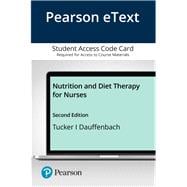A complete guide to nutrition care for nurses.
Nutrition and Diet Therapy for Nurses offers the perfect balance of the latest evidence-based content, readability, and current topics in nutrition. Building from foundational principles to medical therapies, the text provides nursing students with tools and resources they can use to integrate nutrition into the nursing care process and become a reliable source of nutrition information and care. The 2nd Edition includes reorganized chapters, expanded content, and a new feature on drug interactions woven throughout the text.
For courses in nutrition and diet therapy.
Pearson eText is an easy-to-use digital textbook that you can purchase on your own or instructors can assign for their course. The mobile app lets you keep on learning, no matter where your day takes you -- even offline. You can also add highlights, bookmarks, and notes in your Pearson eText to study how you like.
NOTE: This ISBN is for the Pearson eText access card. Pearson eText is a fully digital delivery of Pearson content. Before purchasing, check that you have the correct ISBN. To register for and use Pearson eText, you may also need a course invite link, which your instructor will provide. Follow the instructions provided on the access card to learn more.










